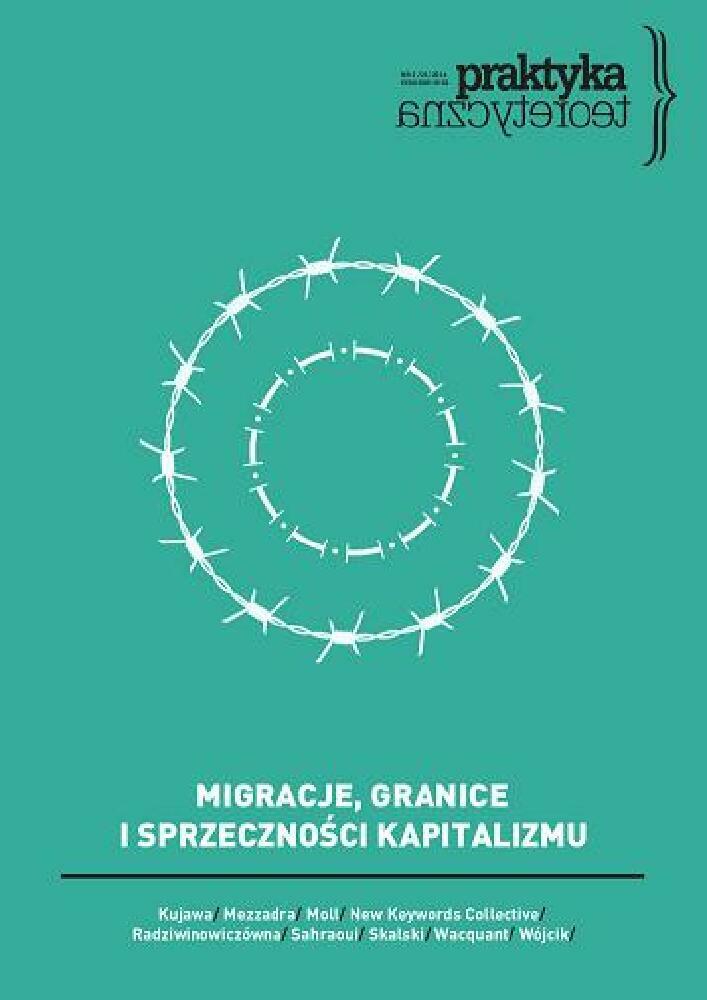Abstrakt
Nowy Słownik „kryzysu” „Europy” i w „Europie” jest efektem warsztatu zorganizowanego przez Nicholasa De Genovę oraz Martinę Tazzioli w King’s College London, 25-26 czerwca 2015 roku. Ambicją i założonym celem Słownika jest skuteczne „przechwycenie” dominującego dyskursu otaczającego i nadzorującego to, w jaki sposób mówimy i myślimy o wzajemnych spotkaniach „Europy” i „kryzysu”. W tym kontekście tak zwany „kryzys migracyjny” w rzeczywistości oferuje kluczowe perspektywy umożliwiające uchwytywanie szerszej dynamiki „kryzysu” „Europy” i „w Europie” oraz europejskiego podejścia do granic.Bibliografia
Agamben, Giorgio. 2013. „The Endless Crisis as an Instrument of Power: In Conversation with Giorgio Agamben”. Verso Blog (04 czerwca 2013); tłumaczenie z języka niemieckiego artykułu z Frankfurter Allgemeine Zeitung (24 maja 2013).; http://www.versobooks.com/blogs/1318-the-endless-crisis-as-an-instrument-of-power-in-conversation-with-giorgio-agamben.
Balibar, Étienne. 2004. We, the People of Europe? Reflections on Transnational Citizenship. Princeton, NJ: Princeton University Press.
Béjin, A. i E. Morin (red.) 1975. „La notiondecrise. Centre d’études transdisciplinaires: Communication 25.
Bunyan, Tony. 2015. „The view from Brussels. Missed opportunities to call the European Union to account”. W Report: Moving Stories. International Review of How Media Cover Migration. red. A. White. Ethical Journalism Network. http://ethicaljournalismnetwork.org/assets/docs/038/141/6adda26-23eaf8d.pdf.
Casas-Cortes, Maribel, Sebastian Cobarrubia, Nicholas De Genova, Glenda Garelli, Giorgio Grappi, Charles Heller, Sabine Hess, Bernd Kasparek, Sandro Mezzadra, Brett Neilson, Irene Peano, Lorenzo Pezzani, John Pickles, Federico Rahola. Lisa Riedner, Stephan Scheel i Martina Tazzioli. 2015. „New Keywords: Migration and Borders.” Cultural Studies 29(1): 55–87.
De Genova, Nicholas. 2013. „ Spectacles of Migrant »Illegality«: The Scene of Exclusion, the Obscene of Inclusion”. Ethnic and Racial Studies 36(7): 1180–-98.
De Genova, Nicholas. 2015. „In the Land of the Setting Sun: Reflections on »Islamization« and »Patriotic Europeanism«. Movements: Journal für kritische Migrations- und Grenzregimeforschung 1(2). http://movements-journal.org/issues/02.kaempfe/15.de-genova--pegida-islamization-patriotic-europeanism.html.
De Genova, Nicholas. 2016. „The »European« Question: Migration, Race, and Post-Coloniality in »Europe«.”. W An Anthology of Migration and Social Transformation: European Perspectives, red. Anna Amelina, Kenneth Horvath i Bruno Meeus. New York: IMISCOE Research Series/ Springer.
De Genova, Nicholas i Martina Tazzioli. 2015. „The »European« Question after Charlie Hebdo: An Interview with Nicholas De Genova by Martina Tazzioli”. Darkmatter: international peer-reviewed online journal of postcolonial critique 12/2015.
Garelli, Glenda i Martina Tazzioli. 2013. „Migration Discipline Hijacked: Distances and Interruptions of a Research Militancy”. Postcolonial Studies 16(3): 299–308.
Gregory, Derek. 2011. The Colonial Present. Oxford: Blackwell.
Harvey, David. 2008. Neoliberalizm: historia katastrofy. Tłum. Jerzy Paweł Listwan. Warszawa: Instytut Wydawniczy Książka i Prasa.
Harvey, David. 2014. Seventeen Contradictions and the End of Capitalism. London: Profile Books.
Klein, Naomi. 2009. Doktryna szoku: jak współczesny kapitalizm wykorzystuje klęski żywiołowe i kryzysy społeczne. Tłum. Hanna Jankowska. Warszawa: Wydawnictwo Literackie MUZA SA.
Koselleck, Reinhart. 2006. „Crisis”. Journal of the History of Ideas 67(2): 357–-400.
Loewenstein, Antony. 2015. Disaster Capitalism: Making a Killing Out of Catastrophe. New York and London: Verso.
Mezzadra, Sandro i Brett Neilson. 2013. Border as Method, or, the Multiplication of Labor. Durham, NC: Duke University Press.
Mirowski, Philip. 2013. Never Let A Serious Crisis Go to Waste: How Neoliberalism Survived the Financial Meltdown. New York and London: Verso.
Parrochia, D. 2008. La Forme des Crises: Logique et épistémologie. Seyssel, France: Éditions Champ Vallon.
Riedner, Lisa. 2015. „Justice for Janitors? Marktbürgerschaft, Freizügigkeit und EU-Migrantinnen im Arbeitskampf. Einblicke in ein aktivistisches Forschungsprojekt”. Journal für kritische Migrations- und Grenzregimeforschung 1(2).
Roitman, Janet. 2014. Anti-Crisis. Durham, NC: Duke University Press.
Shank, J.B. 2008. „Crisis: A Useful Category of Post-Social Scientific Analysis?”. American Historical Review 113 (4): 1090–99.
Starn, R. 1971. „Historians and »Crisis«”. Past and Present 52: 3–22.
Todorova, Maria. 1994. „The Balkans: From Discovery to Invention”. Slavic Review 53(2): 453–82.
Todorova, Maria. 2008. Bałkany wyobrażone. Tłum. Piotr Szymor, Magdalena Budzińska. Wołowiec: Wydawnictwo Czarne.
van Baar, Huub. 2012. „Socio-economic Mobility and Neo-liberal Governmentality in Post-Socialist Europe”. Journal of Ethnic and Migration Studies 38(8): 1289–1304.
van Baar, Huub. 2015. „The Perpetual Mobile Machine of Forced Mobility and the Institutionalization of Rootlessness”. W The Irregularization of Migration in Contemporary Europe: Deportation, Detention, Drowning, red. Yolande Jansen, Robin Celikates, i Joost de Bloois. London and New York: Rowman and Littlefield.
van Baar, Huub. 2017a. „Evictability and the Biopolitical Bordering of Europe”. Antipode 49 (1): 212–230.
Walters, William. 2010. „Imagined Migration World: The European Union’s Anti-Illegal Migration Discourse.” W The Politics of International Migration Management, red. Martin Geiger and Antoine Pécoud. New York: Palgrave Macmillan.
Žižek, Slavoj. 2000. „Underground, or Ethnic Cleansing as a Continuation of Poetry by Other Means.” Intercommunication 18. http://www.ntticc.or.jp/pub/ic_mag/ic018/intercity/zizek_E.html.
Licencja
Autorzy:
„Praktyka Teoretyczna” jest pismem, które chce realizować idee wolnego dostępu do wiedzy i poszerzania domeny dobra wspólnego. Ma służyć rozwojowi nauki i krytycznej refleksji w Polsce i na świecie w imię idei wolnego dostępu do wiedzy (Open Access). Całe pismo jest udostępniane za darmo w Internecie na warunkach licencji CC-BY-NC-SA (Uznanie autorstwa-Użycie niekomercyjne-Na tych samych warunkach 4.0 Międzynarodowe) w wersji 4.0 (szczegółowe warunki: http://creativecommons.org/licenses/by-nc-sa/4.0/). Artykuły w nim zamieszczone mogą być dowolnie przechowywane, kopiowane, drukowane, rozpowszechniane i wykorzystywane do celów naukowo-dydaktycznych przy zachowaniu warunków licencji. Apelujemy tylko o uznanie autorstwa i podanie źródła w myśl przyjętych w środowisku naukowym standardów.
Nie ma natomiast możliwości komercyjnego wykorzystania zgromadzonych zasobów bez pisemnej zgody wydawcy. Dostęp do czasopisma nie może być dystrybuowany za opłatą czy w jakikolwiek inny sposób limitowany przez inne podmioty.
Autorzy tekstów przyjętych do publikacji w czasopiśmie „Praktyka Teoretyczna” są zobowiązani do wypełnienia, podpisania i odesłania na adres redakcji umowy o udzielenie nieodpłatnej licencji do utworów, z zobowiązaniem do udzielania sublicencji CC [PL.pdf, PL.doc, EN.pdf, EN.doc].
Zgodnie z umową, autorzy tekstów opublikowanych w czasopiśmie „Praktyka Teoretyczna” udzielają wydawcy czasopisma niewyłącznej i nieodpłatnej licencji oraz zezwalają na użycie sublicencji Creative Commons Uznanie autorstwa-Użycie niekomercyjne-Na tych samych warunkach 4.0 Międzynarodowe (CC-BY-NC-SA 4.0).
Autorzy zachowują prawa do dalszego, swobodnego rozporządzania utworem.
Autorzy nadsyłanych artykułów powinni upewnić się, czy wykorzystywane przez nich materiały nie są chronione prawami autorskimi na rzecz innych osób i ponoszą odpowiedzialność za ewentualne uchybienia w tym względzie.
